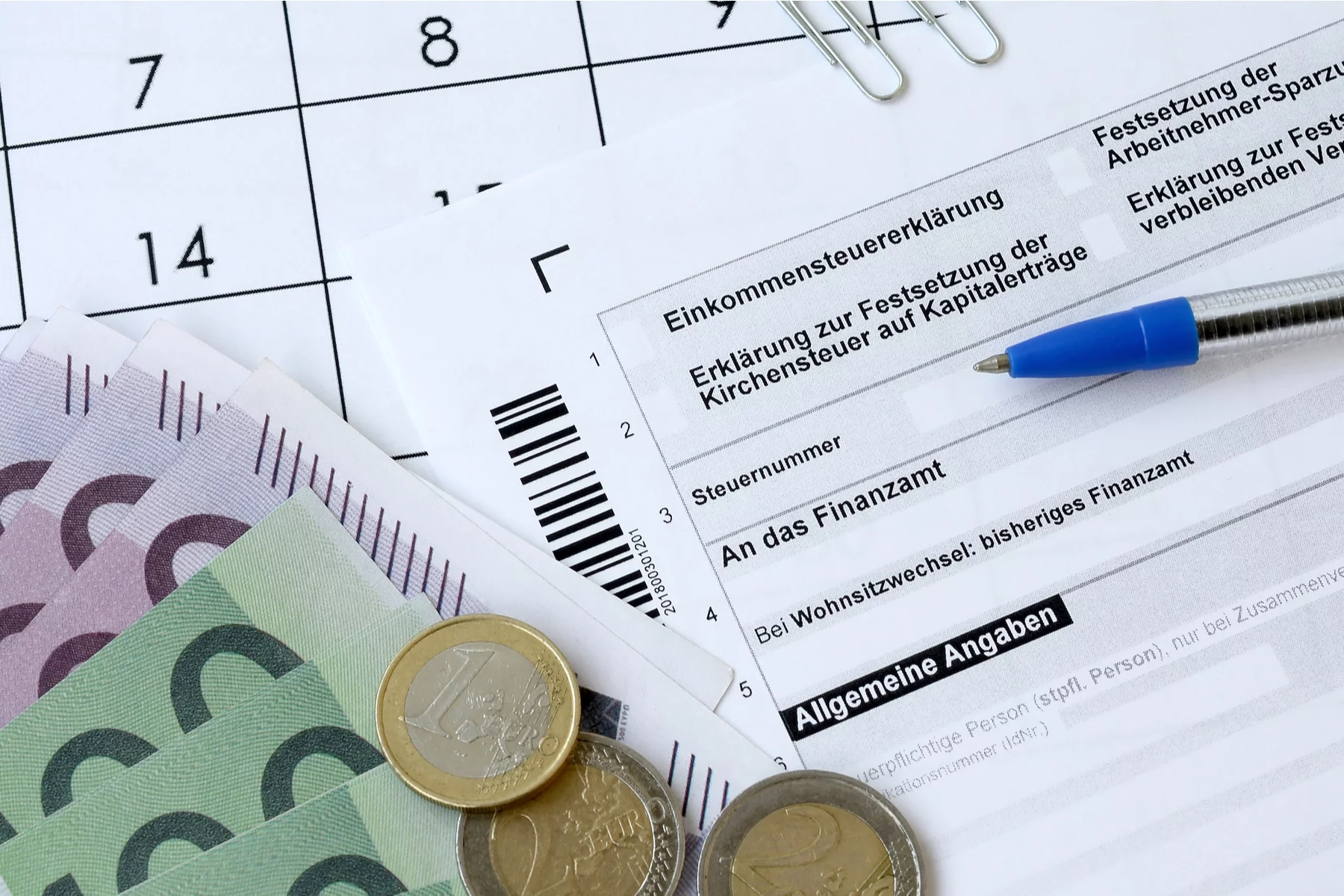If you’re planning on living or retiring in Germany, it’s helpful to know how inheritance tax works, and how it might affect your assets. Bear in mind that inheritance tax rules may differ from those in your home country. In fact, German inheritance tax for non-residents and internationals can be also subject to certain exemptions.
For international residents dealing with cross-border inheritance matters, managing money transfers between countries can be an additional challenge. Providers like Wise can simplify this process, offering cost-effective international transfers with the mid-market exchange rate, which is particularly valuable when moving substantial inheritance funds across different currencies.
To help you understand inheritance law, read on for information on the following topics:
BuchhaltungsButler
Streamline your German book keeping with BuchhaltungsButler online accounting software. With simple workflows and automation, you can make accounting faster and easier. Their software is GoBD-compliant and can be tailored to the needs of your company. Try BuchhaltungsButler today for straightforward accounting.
German inheritance law and succession rules
The federal government in Germany is in charge of inheritance law. It applies the rules across the country, without any regional variations.
Germany also follows universal succession. This means that heirs inherit the deceased’s assets – as well as debt obligations – without the need for an executor or a court ruling.

Forced heirship rules in Germany aren’t as strict as some other European countries, but a person can exclude close relatives who are natural heirs from their will.
Equally, statutory heirs who have been excluded can make a claim (Pflichtteil) on the estate. However, they may need to provide a Certificate of Inheritance under German Probate Law.
If there is no will, European Union (EU) rules apply. This means if a foreign resident dies without leaving a will, the law of the country in which they resided for the last five years will apply.
Inheritance law on pensions in Germany
In addition to money held in bank accounts, surviving relatives may also be able to inherit the deceased’s pension.
Inheritance law in Germany includes a survivor’s pension, a child-raising pension, and an orphan’s pension for widows, widowers, and surviving children.
However, the deceased must have fulfilled a minimum insurance period of five years of contributions before passing away for the surviving relatives to be eligible. In a few cases, it can be sooner. This might be the case if they died because of an accident at work, or shortly after completing training.
The couple must also have been married for at least a year for the spouse to be entitled to a widower’s pension.
Services such as Pensionfriend specialize in helping internationals navigate the German pension landscape.
Inheritance tax in Germany
Inheritance tax rates in Germany are consistent across the whole country. They apply to savings, property, and other valuable assets. However, there are several allowances and exemptions in place under German tax law.
Charges depend on the heir’s relationship with the deceased. Close relatives such as spouses and children pay less tax than anyone else.
There are three relationship categories. The following table shows which category relatives and other individuals fit into and the tax-free allowance they receive:
| Category | Relationship | Tax-free allowance |
| 1 | Spouse/civil partner | €500,000 |
| 1 | Children (including adopted children), stepchildren, grandchildren/great-grandchildren | €400,000 |
| 1 | Grandchildren/great-grandchildren of living children | €200,000 |
| 1 | Parents and grandparents | €100,000 |
| 2 | Siblings, nieces/nephews, step-parents, relatives by marriage, divorced spouse | €20,000 |
| 3 | All other individuals, including legal entities | €20,000 |
These categories are then used to determine the rate of inheritance tax charged, ranging from 7% to 50%.
How much is inheritance tax in Germany?
| Value | Category-1 | Category-2 | Category-3 |
| Up to €75,000 | 7% | 15% | 30% |
| €75,000–€300,000 | 11% | 20% | 30% |
| €300,000–€600,000 | 15% | 25% | 30% |
| €600,000–€6,000,000 | 19% | 30% | 30% |
| €6,000,000–€13,000,000 | 23% | 35% | 50% |
| €13,000,000–€26,000,000 | 27% | 40% | 50% |
| More than €26,000,000 | 30% | 43% | 50% |
German inheritance tax applies to the taxable base. This is the amount you inherit after the debts of the deceased, funeral, and administration expenses, and any other personal exemptions have been taken away.
If the funeral and administrative costs aren’t substantiated, a lump sum of €15,000 per inheritance may be deducted instead. This increased in 2025 from the previous figure of €10,300.
Heirs that inherit more than €26,000,000 can apply for a tax abatement if they can prove they are unable to pay the tax from their available assets.
Available assets are defined as being half the sum of the inheritance’s value and the heir’s previously-owned assets.
There are exemptions for certain items, such as:
- Household goods and personal effects up to €41,000
- Works of art, cultural assets, or items of scientific interest
- German-based pension plans
- Some business assets
- Gifts to churches or charities
Large amount transfers with Wise
Wise supports large international transfers of up to the equivalent of 1 million GBP in most currencies. Their volume discounts automatically reduces transfer fees when you transfer over 20,000 GBP or equivalent in other currencies. Wise offers the mid-market rate with transparent fees, meaning more of your inheritance money reaches its destination.
Estate tax in Germany
Estate tax rules in Germany may apply if the property makes up part of the deceased’s estate. The property’s value is assessed on its fair market value (FMV) at the time of death.

For a property to be recognized as part of a German estate, it needs to be registered in the local land registry (Grundbuch). You can also find out more in our article about buying German property.
Some properties are exempt from estate tax in Germany. If there’s a property that’s been used as the family residence before the deceased passed away, it is exempt from German estate tax as long as:
- It is inherited by the spouse
- The property will be used as the family home for the next 10 years
- It is located in the EU or European Economic Area (EEA)
Real estate that has a public interest, and community or jointly-owned property, is also exempt.
In cases where the property is in another country, Germany has estate tax treaties in place to avoid double taxation. This applies in countries such as Denmark, France, Sweden, Switzerland, and the United States.
Full details of double tax treaties in Germany are maintained by Germany’s Bundesministerium der Finanzenhere (the Federal Ministry of Finance).
If the amount of foreign tax owed is similar to German inheritance and gift tax, it may be credited proportionally against it.
How do I pay inheritance tax in Germany?
If you’re responsible for paying German inheritance tax, you generally have one month to file an inheritance tax return.
Each heir must file a return for their respective share of the estate. However, if there is an executor, they file the tax return.

If it’s not possible to submit the tax return at this time, an extension is granted in most cases, but only after applying for it.
You can pay your inheritance tax online or send it in the mail.
International inheritance payments
For expats and international heirs dealing with cross-border inheritance, converting and transferring money can be a significant concern. While banks can handle these international transfers, they might charge high fees and use unfavorable exchange rates when converting currencies, which can substantially reduce the inherited amount you receive.
Wise offers a cost-effective alternative for managing inheritance tax payments that involve currency conversion. With transparent fees and the mid-market exchange rate, you can transfer large sums internationally without losing a significant portion to hidden fees.
Wise supports high transfer limits, typically equivalent to 1 million GBP, and offers automatic discounts on large transfers over 20k GBP (or equivalent in other currencies) making it suitable for substantial inheritance payments.
Who pays German inheritance tax?
You’ll be liable to pay inheritance tax in Germany if either the beneficiary is a German taxpayer, the deceased was a German taxpayer, or certain assets are located in Germany. The liability for paying inheritance tax depends on what’s been received.
In the case of an inheritance, it’s down to the heir to pay both inheritance tax and any debts left by the deceased.
If you have received a donation, both the donor and the recipient are jointly liable to pay. However, if a donation or bequest is made for a special cause (zweckzuwendung), the person who makes the donation or bequest must pay the relevant tax.
How to avoid inheritance tax in Germany
You can reduce your inheritance tax liability in Germany by deducting things such as funeral and administrative costs as expenses.
If you’re in a position where you can choose between German inheritance tax and another country’s system, it’s worth checking which rules best suit your circumstances.
Those planning their estates who want to reduce the taxes of their heirs could choose to pay in larger amounts to their pension. Money within a pension is exempt from German inheritance tax.
Additionally, they could consider ensuring that the largest parts of their estate go to relatives that receive the highest tax allowance.
Managing international inheritance transfers
Handling an inheritance that spans multiple countries presents unique challenges. From accessing funds in foreign bank accounts to converting different currencies and transferring assets to heirs, the process requires effective financial tools.
Wise offers international transfers for personal and business customers, with high transfers limits (usually around 1 million GBP, and it’s equivalent in other currencies). For large amount transfers, Wise provides automatic discounts on transfer fees – discounts apply for transfers over 20k GBP (or equivalent in other currencies). The discount percentage increases as your transfer amount grow.
Wise uses mid-market exchange rates for currency conversion, with low and transparent conversion fees, allowing you to keep transfer costs down when you’re moving your inheritance internationally.
When sending large inheritance amounts, Wise may request documentation about the source of funds to ensure security and compliance with international regulations. Their specialized large transfers support team can guide executors through this verification process, helping to ensure smooth transfers of inherited assets across borders.
Useful resources
- Bundesministerium der Finanzenhere – Federal Ministry of Finance (in German)
- German Civil Code
- German Tax Authority








